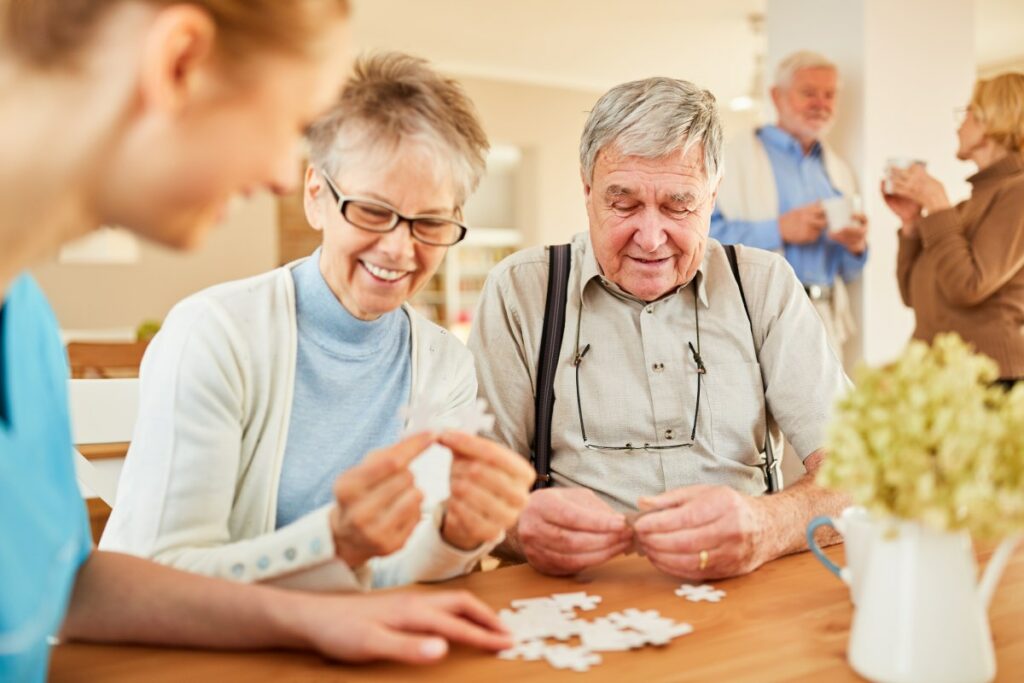As adult children, one of the most challenging aspects of caring for a senior loved one is witnessing changes in their behavior and thinking. Sundowning, also known as “sundowner’s syndrome,” is commonly observed in individuals with Alzheimer’s or other forms of dementia.
What is Sundowning?
Sundowning shows up as increased agitation, confusion, and restlessness that occurs in the late afternoon or evening, often persisting into the night. In this blog post, we will explore what sundowning is and provide strategies to help loved ones. Oklahoma memory care communities like The Gardens at Quail Springs specialize in helping seniors with dementia manage their symptoms and improve their quality of life.
Sundowning is a complex condition that affects many seniors with dementia, but its exact cause is unknown. Experts believe that several factors contribute to sundowning symptoms, including disruptions in the body’s internal clock, exhaustion from daily activities, sensory overload, and the effects of diminishing natural light. It’s important to recognize that sundowning is not a deliberate behavior but rather a result of neurological changes and environmental triggers.
Tips for Helping Your Loved One
While there is no known cure for sundowning, there are numerous techniques and strategies that can help manage and reduce its symptoms. By employing the following tips, memory care staff create a soothing and supportive environment for your senior loved one in an Oklahoma memory care community.
Maintain a Consistent Routine
Structured daily schedules help provide a sense of familiarity and security. This includes consistent meal times, engaging activities, and regular sleep patterns. Predictability can help alleviate anxiety and confusion.
Use Soothing Lighting
Natural light exposure during the day can help regulate sleep-wake cycles and reduce the severity of sundowning symptoms. Open curtains, encourage outdoor activities and ensure that rooms are well-lit. In the evening, minimize harsh lighting and promote a calm ambiance with soft, warm lighting.
Create a Calming Environment
Reduce noise, clutter, and other stimuli that may overwhelm your loved one. Soft music, aromatherapy, and gentle activities, such as reading or light puzzles, can provide a calming effect. Ensure that their living space is hazard-free, comfortable, and familiar, with cherished personal belongings.

Monitor Medications
Some medications can contribute to sundowning symptoms. Regularly review your loved one’s medications with their health care provider to identify any potential side effects or interactions that may impact their behavior.
Engage in Relaxation Techniques
Encourage your senior loved one to practice relaxation techniques such as deep breathing exercises, listening to calming music, or engaging in gentle stretching. These activities can help reduce anxiety and promote a sense of tranquility. Music has long been shown to improve symptoms of dementia. Put on your loved one’s favorite song and sing with them.
Encourage Physical Activity
Regular exercise during the day can help expend excess energy and promote better sleep patterns at night. A specialized memory care community will engage your loved one in activities appropriate for their abilities, such as walking, stretching, or light chair exercises.
Seek Support
Reach out to professionals specializing in memory care, such as a specialized Oklahoma memory care community. They possess the expertise and resources to provide care tailored to seniors with dementia.
Sundowning can be challenging for both seniors and their caregivers, but with patience, understanding, and appropriate strategies, you can manage the symptoms. By establishing a consistent routine, optimizing lighting, creating a calming environment, and seeking out resources that understand the condition, you can help reduce the risks associated with sundowning for your senior loved one in Oklahoma memory care.
Remember, each individual’s experience with sundowning is unique, and it may take time to find the most effective combination of techniques. Be flexible, and compassionate, and maintain open communication with health care professionals to ensure your loved one’s well-being.
Experience how A Garden Walk can help your loved one.
Finding the best memory care facility doesn’t have to be hard. We are here to help. Contact The Gardens at Quail Springs in Oklahoma City today.

